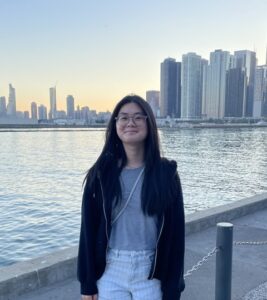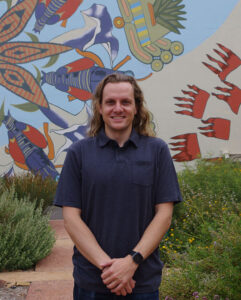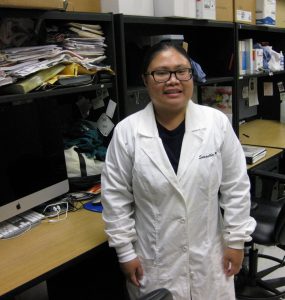Matthew Mealka, 2024 Alison Huxford Memorial Fellow

Sally Luong, 2023 Alison Huxford Memorial Fellow

Ryne Holmberg, 2022 Alison Huxford Memorial Fellow

Samantha N. Cohen, 2021 Alison Huxford Fellow

About the Fellow: Matthew Mealka is a graduate of San Diego State University. He began his graduate studies in Chemistry & Biochemistry at SDSU in 2018 and advanced to candidacy in the Ph.D. program in 2023. Matt is leading an ambitious project to structurally characterize multisubunit IκB Kinase (IKK) complexes that contain at least one catalytic subunit and the NEMO/IKKgamma accessory subunit. The approach that Matt is taking is single particle cryo-transmission electron microscopy (cryo-EM) on samples that he has prepared and trapped in physiologically relevant, stable conformations in order to yield useful structural models. The hope is that we might finally be able to observe this challenging enzyme complex in the process of becoming activated so that we can identify novel strategies for controlling its behavior in cells. Matt is also an expert protein biochemist and x-ray crystallographer whose technical skills have proven invaluable in advancing our knowledge of how mutations to human NADP+-dependent Isocitrate Dehydrogenase enzymes cause cancer, informing diverse metal ion binding protein design efforts, and supporting other solution-based experimental studies of IKK activation.
About the Fellow: Sally Luong is a graduate of San Diego State University. She began her graduate studies in Chemistry & Biochemistry at SDSU in 2019 and advanced to candidacy in the Ph.D. program in 2023. Sally is taking a novel approach to studying the enigmatic NEMO subunit of the IκB Kinase (IKK) complex. This is the enzyme that is primarily responsible for controlling expression of cell inflammatory genes through transcription factor NF-κB. For many years it was suspected that the NEMO subunit played a relatively straightforward scaffolding role in recruiting and holding together the complex of IKK protein subunits that ultimately serve to regulate and direct its enzymatic activity. Following up on recently published data that suggested a more direct, allosteric role for NEMO in IKK catalytic activation, Sally has endeavored to apply CRISPR/Cas9 technology to edit different regions of the NEMO gene in cultured human cells and study the effect of these targeted mutations on NF-κB signaling through IKK. Sally’s hope is that analysis of these novel cell lines will allow for direct detection of the mechanism(s) by which NEMO responds to distinct cellular inflammatory signals and functions actively to prime IKK for induction of NF-κB activity.
About the Fellow: Ryne Holmberg is a graduate of Point Loma Nazarene University. He entered the graduate program in Chemistry & Biochemistry at SDSU as a direct admit doctoral student in 2016 and advanced to Ph.D. candidacy in 2019. Ryne’s doctoral research aims to understand how signaling to induce transcription factor NF-κB activity influences the ability of tumor initiator cells to survive chemotherapy and promote relapse in ovarian cancer patients who have entered remission. Ryne’s studies have demonstrated that an inflammatory cytokine known as TWEAK and its receptor Fn14 are highly expressed in ovarian tumors following chemotherapy and that TWEAK treatment of cultured ovarian cancer cells promotes their tumor-like behavior. Interfering with the NF-κB pathway that responds to TWEAK prolongs survival in mice with ovarian cancer after chemotherapy, suggesting that the TWEAK-Fn14-induced NF-κB signaling pathway is a promising target for the development of therapies to improve the outcomes of ovarian cancer patients.
About the Fellow: Samantha Cohen is a graduate of UC Riverside. She entered the graduate program in Chemistry & Biochemistry at SDSU in 2015 and advanced to Ph.D. candidacy in 2018. Sam’s doctoral research centers upon understanding how cells control the activity of the important signaling enzyme known as the IκB Kinase (IKK) complex. This enzyme is largely responsible for the cellular decision to mount a genetically encoded response to any of a number of diverse potentially harmful environmental stimuli by unleashing the gene expression potential of transcription factor NF-κB. Sam is taking the novel approach of engineering, expressing, purifying, and directly studying a version of the IKK complex that functions in a key innate immune signaling pathway in fruit flies. Her work is providing some of the first direct structural and biochemical measurements of this fascinating enzyme complex.